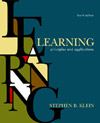| active avoidance response | An overt response to a feared stimulus that prevents an aversive event.
|
 |
 |
 |
| escape response | A behavioral response to an aversive event that is reinforced by the termination of the aversive event.
|
 |
 |
 |
| flooding | A behavior therapy in which a phobia is eliminated by forced exposure to the feared stimulus without an aversive consequence.
|
 |
 |
 |
| modeling | The acquisition of behavior as a result of observing the experiences of others.
|
 |
 |
 |
| negative punishment | Loss or unavailability of reinforcement because of inappropriate behavior.
|
 |
 |
 |
| omission training | A schedule of reinforcement in which the absence of responding leads to reinforcement.
|
 |
 |
 |
| pain-induced aggression | Anger and aggressive behavior elicited by punishment.
|
 |
 |
 |
| passive avoidance response | A contingency in which the absence of responding leads to the prevention of an aversive event.
|
 |
 |
 |
| positive punishment | The use of a physically or psychologically painful event as the punisher.
|
 |
 |
 |
| punishment | A means of eliminating undesired behavior by using an aversive event that is contingent upon the occurrence of the inappropriate behavior.
|
 |
 |
 |
| response cost | A negative punishment technique in which an undesired response results in either the withdrawal of or failure to obtain reinforcement.
|
 |
 |
 |
| response prevention | A behavior therapy where a phobia is eliminated by forced exposure to the feared stimulus without an aversive consequence.
|
 |
 |
 |
| time-out from reinforcement | A negative punishment technique in which an inappropriate behavior leads to a period of time during which reinforcement is unavailable
|
 |
 |
 |
| vicious-circle behavior | An escape response that continues despite punishment, due to a failure to recognize that the absence of the escape behavior will not be punished.
|



 2002 McGraw-Hill Higher Education
2002 McGraw-Hill Higher Education